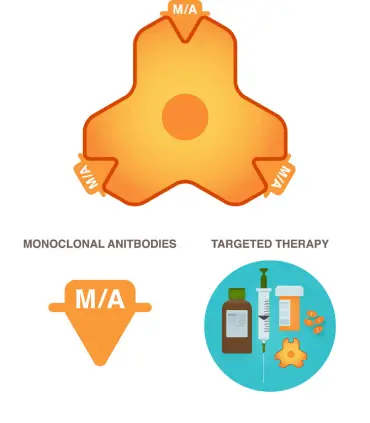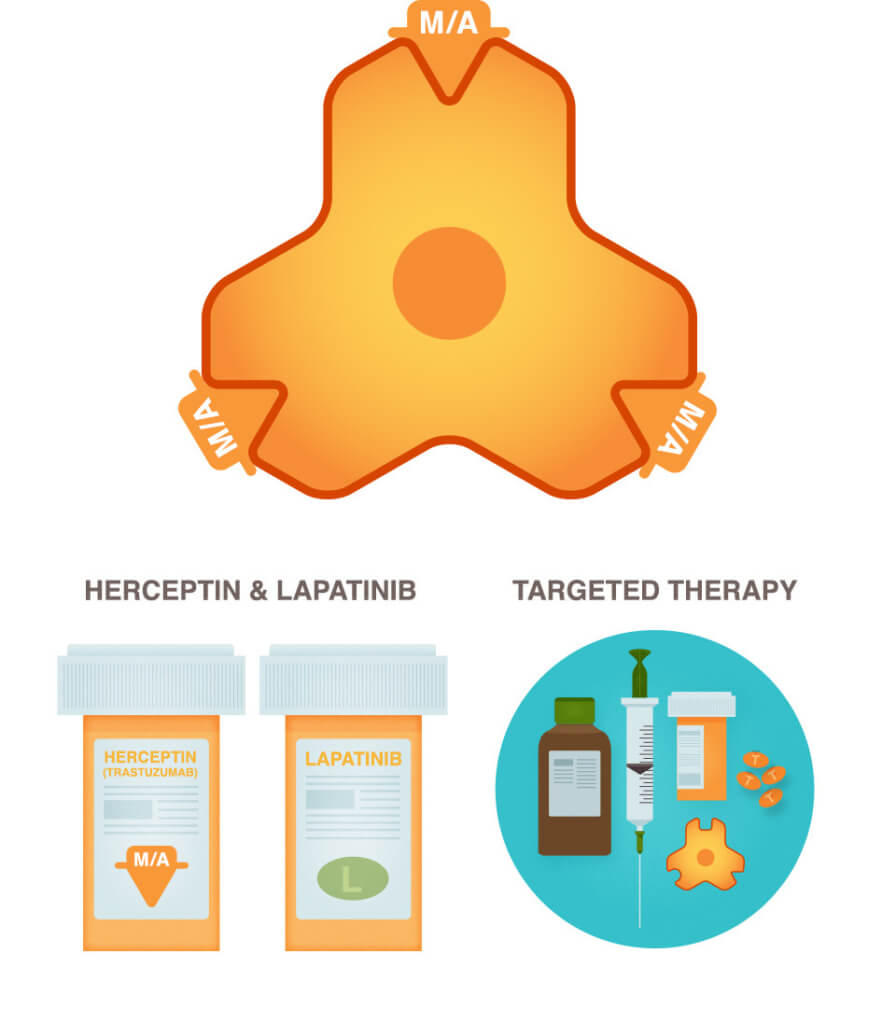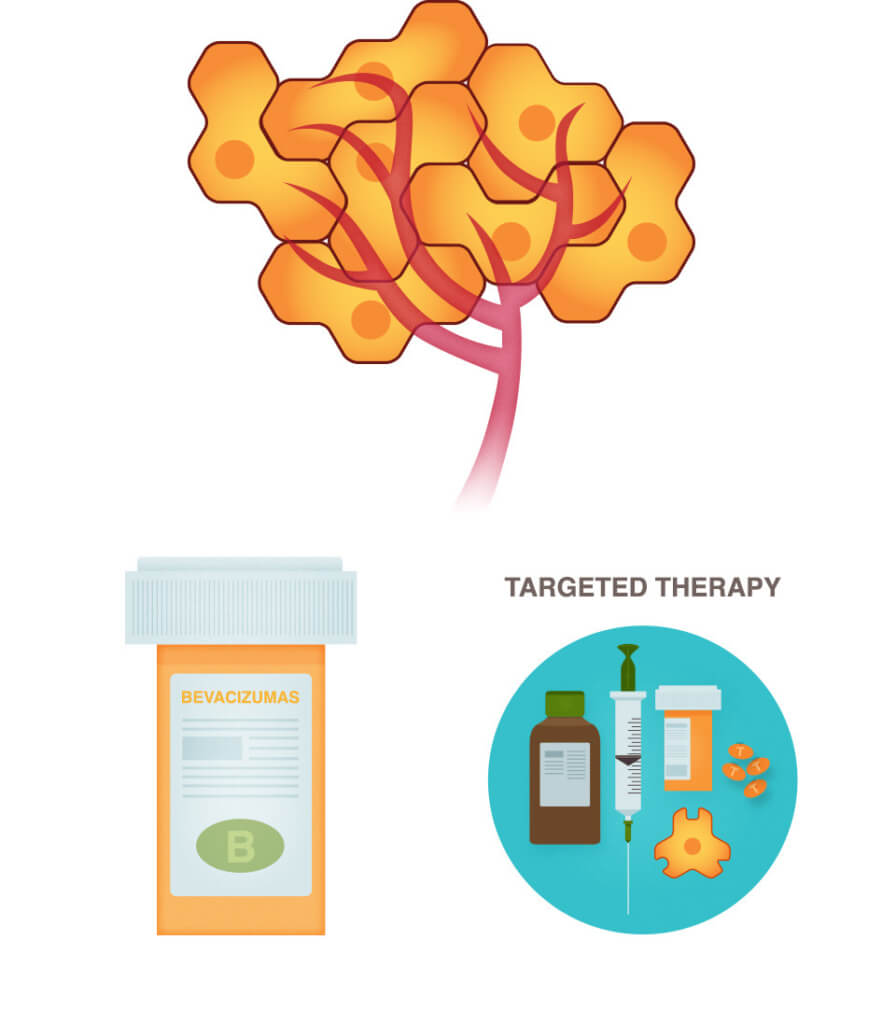Targeted Therapy
What Is Targeted Therapy?
In addition to chemotherapy and hormone therapy, there are newer, more effective treatments that can attack specific breast cancer cells without harming normal cells. Currently, these biologic targeted methods are commonly used in combination with traditional chemotherapy. However, targeted drugs often have less severe side effects than standard chemotherapy drugs.

How do breast cancer biologic targeted therapies work?
Breast cancer biologic targeted therapy uses drugs that block the growth of breast cancer cells in specific ways. For example, targeted therapy may block the action of an abnormal protein (such as HER2) that stimulates the growth of breast cancer cells. For example, Trastuzumab (Herceptin®) or lapatinib (TYKERB®) may be given to a woman whose lab tests show that her breast tumor has too much HER2.
Monoclonal Antibodies: Binding Agents For Cancer Cells

One type of biologic targeted therapy currently being studied is monoclonal antibodies. These laboratory-manufactured proteins bind with certain cancers.
Herceptin: Targeting HER2-Positive Receptors
Monoclonal antibody drugs such as Herceptin (also known as Trastuzumab) target HER2-positive tumors. If cancer cells are positive for the HER2/neu receptors that means there is an overabundance of receptors on the cancer cell for the growth-stimulating HER2 protein.
The tumor acts almost like a magnet for growth hormones, and when the tumor cells connect with growth hormone cells, the cancer can quickly grow and multiply. Herceptin helps shrink these HER2-positive tumors by finding the cells, binding with them, and blocking the action of the receptor.
This type of drug is given through a vein. It may be given alone or with chemotherapy. Side effects that most commonly occur during the first treatment include fever and chills.
Other possible side effects include weakness, nausea, vomiting, diarrhea, headaches, difficulty breathing, and rashes. These side effects generally become less severe after the first treatment. Herceptin also may cause heart damage, heart failure, and serious breathing problems. Before and during treatment, your doctor will check your heart and lungs.
How Are Herceptin And Other Biologic Targeted Therapies Administered And What Are The Likely Side Effects?
The drug Herceptin is given through a vein. It may be given alone or with chemotherapy. Side effects that most commonly occur during the first treatment include fever and chills.
Other possible side effects include weakness, nausea, vomiting, diarrhea, headaches, difficulty breathing, and rashes. These side effects generally become less severe after the first treatment. Herceptin also may cause heart damage, heart failure, and serious breathing problems. Before and during treatment, your doctor will check your heart and lungs.

Lapatinib: blocking abnormal proteins that signal cancer cells to multiply
This tablet, taken by mouth, helps stop or slow the spread of cancer cells. Lapatinib is given with chemotherapy or after other methods have not worked to slow the cancer.
Lapatinib is for HER2 positive breast cancers and is commonly used for metastatic breast cancer that has spread to the brain since it crosses the blood-brain barrier.
Side effects can include nausea, vomiting, diarrhea, tiredness, mouth sores, and rashes. It can also cause red, painful hands and feet. Before treatment, your doctor will check your heart and liver. During treatment, your doctor will watch for signs of heart, lung, or liver problems.
As with all medical treatments, if you experience unusual changes in your health during targeted therapy, notify your doctor immediately.

Bevacizumab: Reducing the cancer cells’ blood supply
Another targeted therapy, Bevacizumab, also known as Avastin, prevents tumors from making new blood vessels that could feed the tumor, essentially cutting off the cancer cells from all nutrients.
Options For Metastatic (Stage 4) Breast Cancer Patients
Immunotherapy
Immunotherapy is a relatively new form of treatment for women with metastatic breast cancer. It uses the patient’s immune system to fight the cancer. There are many types of immunotherapy drugs, including pembrolizumab (Keytruda) and atezolizumab (Tecentriq).
PARP Inhibitors
PARP (poly-ADP ribose polymerase) inhibitors are targeted drugs that are given to women with Stage 4 metastatic breast cancer who carry a breast cancer gene mutation. Currently, the PARP inhibitors olaparib (Lynparza) and talazoparib (Talzenne) are FDA-approved for the treatment of HER2- metastatic breast cancer in those who have a BRCA1 or BRCA2 inherited gene mutation.
CDK4/6 Inhibitors
CDK4/6 inhibitors are used to treat ER+, HER2- Stage 4 metastatic breast cancer that has spread (metastasized) to other areas of the body. This treatment is also used in some patients with regionally advanced breast cancer (Stage 3). They are given in combination with an aromatase inhibitor as an initial endocrine-based therapy. This new drug category and treatment combination has given many women with metastatic breast cancer increased life expectancy.
There are additional biologic targeted drugs being developed. Discuss biologic targeted treatment options with your healthcare professional for more details.
Material on this page courtesy of the National Cancer Institute



